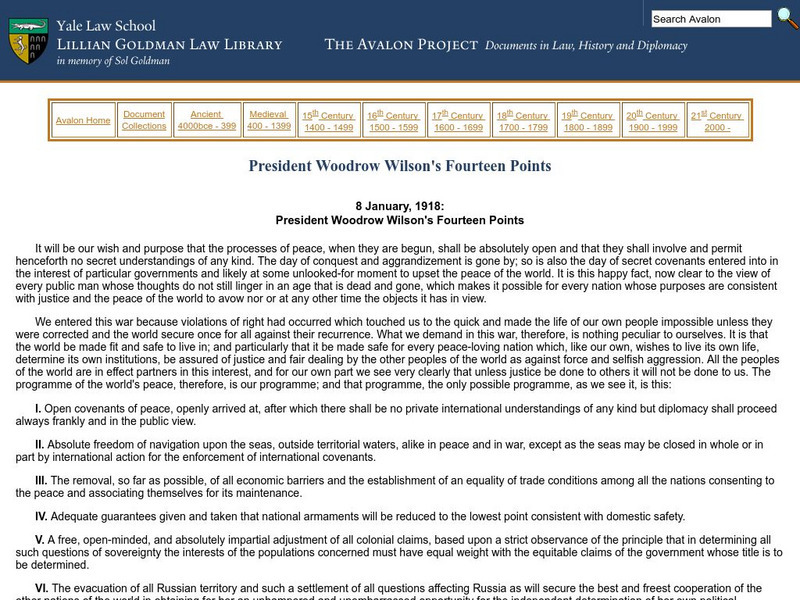Hi, what do you want to do?
DocsTeach
Analyzing Woodrow Wilson's Fourteen Points
The end of a war means the causes were resolved, right? Not for World War I. By examining Woodrow Wilson's Fourteen Points, budding historians consider imperialism, nationalism, militarism, and alliances, as well as Wilson's efforts to...
Curated OER
Lesson 4: Fighting for Peace: The Fate of Wilson's Fourteen Points
Students analyze foreign policy. In this Fourteen Points lesson, students examine Wilson's Fourteen Points, explore Allied reaction to the Points, and compare Wilson's foreign policy to the Versailles Treaty.
Curated OER
Wilson Stands Alone in His Plan for World Peace
Students study the Fourteen Points. They examine motives behind Wilson's Fourteen Points and why most of them were rejected by France. They answers questions concerning primary resources (casualty list and before and after...
Curated OER
President Woodrow Wilson's Fourteen Points
Ninth graders evaluate President Woodrow Wilson's principle of self-determination and its effects today. In groups, they research how the Great Powers dealt with Korea at the Paris Peace Conference and compare their perspectives with...
Alabama Department of Archives and History
Alabama and the Treaty of Versailles
As part of a study of the treaty that ended World War I and the seeds of resentment it planted, class groups compare President Wilson's Fourteen Points and the articles of the Treaty of Versailles.
Curated OER
George Washington's Foreign Policy
Young scholars compare George Washington's foreign policy to the policies of presidents who followed him. In this primary source analysis instructional activity, students compare Washington's Farewell Address to the Roosevelt Corollary,...
Curated OER
The Debate in the United States over the League of Nations: League of Nations Basics
Students examine Woodrow Wilson's ideas for peace and the League of Nations. They examine how he garnered supported of it by looking at images and discussing their context.
Theodore Roosevelt Association
Defining America's Role in the World
As the first American president to win the Nobel Peace Prize, and only one of four presidents to do so in United States history, Theodore Roosevelt's foreign policy achievements and preservation of peace are often overshadowed by his...
Curated OER
A Flawed Peace
The Paris Peace Conference, the Big Four, and the Treaty of Versailles are all covered in this presentation. Clearly outlined and well-put-together, this is a winning complement to your next lesson on the Flawed Peace.
Curated OER
The Treaty of Versailles: June 1919
There were four key players involved with the Treaty of Versailles. Present information and critical thinking questions regarding Woodrow Wilson, David Lloyd-George, Georges Clemenceau, and Vittorio Orlando. Included also are lists of...
Curated OER
The First World War
In this World War I worksheet, students review a chapter as they match 5 men to their accomplishments, read 5 false statements then make them true, and identify 2 historical themes pertaining America's role in the war.
Curated OER
WWI Document Based Essay
Students read various primary source documents on World War I. After reading each document, they answer discussion questions. Using the internet, they identify the causes of World War I as layed out by President Wilson and his reasons...
Curated OER
March First Independence Movement
Students study the pro-independence movement of 1919 in Korea. In this Korean history lesson, students investigate the implications of Japanese occupation of Korea and create posters that feature the essence of the Korean...
Curated OER
The Treaty of Versailles: The League of Nations Student Worksheet
In this world history worksheet, students read a 1-page selection as well as Internet articles about the Treaty of Versailles and the League of Nations and then respond to 8 short answer questions.
Curated OER
The Cause and Course of the Great War
Students interpret historical evidence presented in primary and secondary resources. In this World War I activity, students research the causes of the war as well as the major events of the war. Students are...
Curated OER
Lesson 2. Symbols of the Stalemate
Eleventh graders identify and analyze the factors that led to WWI's stalemate. They examine The Schliefflen plan and analyze and rectify its strategic flaws.
Curated OER
Reenacting the Treaty of Versailles
Learners examine how provisions in the Treaty of Versailles contributed to events in WWII. They participate in a debate, researching their position, then presenting their national position orally to the class.
Curated OER
Lesson 7. The "Failed Peace"
Students investigate how policies and tactics utilized by the Allies to mobilize national unity and raise patriotism made it more difficult to achieve a humane peace after the war.
Curated OER
Reconstruction Word Search Puzzle
In this social studies activity, students look for the words in the puzzle that are related to the theme of the word search. Spelling skills are worked on.
Curated OER
Selling Warfare - Propaganda Posters
Students examine the use and purpose of propaganda posters during World War I. They work in groups to create a propaganda poster supporting a nation's war effort.
Khan Academy
Khan Academy: Woodrow Wilson's Fourteen Points
The study resource from Khan Academy provides a video lesson for Period 7: 1890-1945 in American History. This lesson discusses President Woodrow Wilson's Fourteen Points. This resource is designed as a review for the AP US History Test.
CommonLit
Common Lit: President Woodrow Wilson's Fourteen Points
A learning module that begins the historical speech "President Woodrow Wilson's Fourteen Points" accompanied by guided reading questions, assessment questions, and discussion questions. The text can be printed as a PDF or assigned online...
Yale University
Avalon Project: President Woodrow Wilson's Fourteen Points
This site provides a copy of Woodrow Wilson's speech of the Fourteen Points given during World War I.
Then Again
Then Again: Web Chron: United States of America Chronology: Wilson's Fourteen Points
A summary of what President Wilson's Fourteen Points were. Provides a brief discussion of why the 14th point was the most controversial.




























